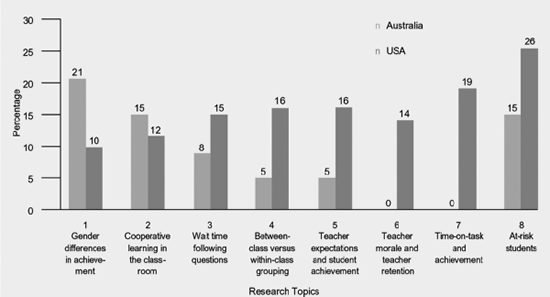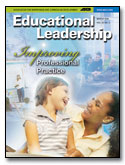Critics have been bad-mouthing education research for at least 75 years, claiming that much of it is flawed and that it has little or no impact on school practices. Early on, such criticisms came from academics trained in other disciplines (see Flexner, 1930; Good, 1939; Judd, 1938; Morrison, 1945). But during the last few decades, prominent political leaders, civil servants, commentators hostile to public schools, journalists, scholars from within education, and even some researchers have lent their voices to a swelling chorus of complaints. For example, Gerald E. Sroufe, director of government relations for the American Educational Research Association, wrote,Education research does not provide critical, trustworthy, policy-relevant information about problems of compelling interest to the education public. (1997)
Bruce Alberts, a recent president of the National Academy of Sciences, commented,It is poignantly clear that research has not had the kind of impact on education that is visible in medical practice, space exploration, energy, and many other fields. (1999, p. vii)
And prominent right-wing academic Chester E. Finn Jr., a frequent critic of public education who served as assistant secretary for research and improvement during the Reagan administration, asserted,To put it simply, our labors haven't produced enough findings that Americans can use or even see the use of: Over the past two decades, there has been a goodly amount of systematic inquiry and a flood of studies, reports, and recommendations, yet our education system has by many measures worsened. (1988)
These criticisms have appeared not only in the United States but also in the United Kingdom, Australia, and other English-speaking countries. For example, a group of prominent scholars and researchers in Australia stated thatEducation administrators and practitioners perceive much of educational research to be irrelevant to their concerns. (McGaw, Boud, Poole, Warry, & McKenzie, 1992)
Such claims certainly make headlines, but are they valid? Surprisingly, this question has attracted little if any investigation. Almost no evidence has yet appeared concerning the actual impact of research on potential users in the education community. Without such evidence, we cannot know whether the complaining choristers have identified a real issue or are merely giving voice to mythic refrains they've heard from others.
To shed some light on the influence of research in schools, we conducted a study examining how one group of educators—school principals—acquire, think about, and use knowledge from education research (Biddle & Saha, 2002/2005). A solid body of scholarly research has established that principals play vital leadership roles in shaping school culture and practice (Bryk, Sebring, Kerbow, Rollow, & Easton, 1998; Leithwood, Begley, & Cousins, 1990; Weiss, 1995). Principals' views about research are therefore important in determining whether schools actually use research knowledge.
Tell us how they used, and what they thought about, resources that provide information about research.
Discuss how they viewed research knowledge and the task of reforming schools.
Provide examples of research knowledge that they considered valuable.
Tell us what they knew about 20 research topics that we had selected, with the help of other experts, to represent important contributions to education.
Give examples of how their schools used research knowledge.
Principals Value, Know About, and Use Education Research
Many critics have claimed that education research has little or no impact because potential users in the education community do not value such research. Our evidence suggests that such claims are nonsense, at least when it comes to school principals. Rather, our study led us to the following conclusions.
Most principals hold positive opinions about education research. Roughly 90 percent of respondents in both Australia and the United States rated knowledge from education research positively and described themselves as users of that knowledge. When asked about problems associated with research knowledge, fewer than one-third mentioned flaws in the conduct of the research. Rather, respondents typically complained that research knowledge was not always relevant to users' needs, that they and their colleagues were sometimes too busy to acquire relevant research knowledge, and that communication between researchers and users was sometimes poor.
Most principals are actively interested in education research that is relevant to their professional needs. The principals had no difficulty volunteering examples of research knowledge they considered useful. The typical respondent mentioned and provided meaningful information about knowledge from at least four, and sometimes eight or more, different research traditions (for example, research on learning styles, effective schools, and mastery learning).
Most principals are at least minimally familiar with a wide range of education research topics. When asked about 20 different research topics that we had chosen to represent important contributions to education (some of them quite obscure), the typical respondent recognized and offered meaningful interpretations of roughly half of those topics. Not surprisingly, Australian and U.S. respondents differed in their familiarity with specific topics. Of all the topics,teacher expectations and student achievement received high recognition among principals in both countries. In addition, U.S. principals were highly familiar with time-on-task and achievement and at-risk students. Australian principals were highly familiar withself-regulated learning.
Most principals are regularly exposed to information sources that present knowledge from research. Most principals whom we interviewed said that they regularly read one or two journals (which they named) that publish reports of research. Moreover, the typical respondent had recently read one or more professional books (which he or she also named) that contained research knowledge; had attended at least one professional meeting or workshop during the last year at which research knowledge was discussed; and had read various kinds of national, regional, and system-level bulletins that discussed research. Many respondents also described their participation in university courses and discussions with other professionals.
Most principals learn about education research from these information sources. Principals who had volunteered examples of research knowledge that they considered valuable cited many different sources for that knowledge. The most common source by far in both the United States and Australia was professional journals. Principals also mentioned workshops organized by others and university or college courses. Others cited as sources professional books, regional or national bulletins, colleagues, and professional meetings. A few respondents mentioned workshops they had organized themselves, school district bulletins, association and union newsletters, or long-term interests.
Most principals believe that research knowledge plays an active role in policy decisions and instructional practice in their schools. When asked for examples of research knowledge they had volunteered to talk about, the typical respondent reported using knowledge from one or more of those examples in their schools. And when asked about the 20 different research topics we had chosen to represent important contributions to education, most respondents were able to describe applications for research in many different areas. (Figure 1 shows the top eight areas.)
Figure 1. Percentages of Principals Who Reported Applications for High-Use Research Topics
How Principals Acquire and Use Research
In addition to indicating that principals are active users of research knowledge, our study yielded insight into how they acquire, process, and use that knowledge.
Acquiring research knowledge. Research knowledge is disseminated through three kinds of sources:primary sources (those used by investigators when they share research knowledge with colleagues in their fields);secondary sources (which provide reports of research knowledge for potential users); andtertiary sources (which interpret research knowledge for the general public). Research reports in primary sources are written by investigators, are subject to peer review, provide details about methodology and findings, and are often rife with jargon. Those in secondary sources may be written by content specialists, feature clearer writing, and typically provide only a few details about study methods. Those in tertiary sources are often prepared by advocates, propagandists, columnists, or journalists. Writing in tertiary sources usually provides few or no details about studies and may project a distorted view of research knowledge tailored to make headlines or to support the authors' ideological viewpoints.
Our results suggest that most principals gain the bulk of their information about research knowledge from secondary sources. When respondents who told us that they had acquired research knowledge from journals were asked to name those sources, they cited 60 different journals. In the United States, the most widely read journals were Educational Leadership (cited by 46 percent of principals),Phi Delta Kappan (32 percent), Education Week (17 percent),Education Digest (11 percent), Catholic School Teacher (11 percent), andMomentum (11 percent). All six of these journals were secondary sources. Not surprisingly, Australian respondents cited somewhat different journals. Their most commonly cited journals included five secondary sources—The Practical Administrator(26 percent),SET (20 percent), Phi Delta Kappan (18 percent),Education News (15 percent), andThe Educational Administrator (10 percent)—as well as two primary sources—the Australian Journal of Education (28 percent) and theJournal of Educational Administration (20 percent).
In addition, many of the professional books that respondents described were works that packaged research knowledge for users. Such packaging was also common in the university courses the principals had taken and in the bulk of professional meetings and workshops they had attended. None of the respondents in either country said they used specific tertiary sources for research knowledge, despite the fact that tertiary reports of education research findings are common in both countries.
Processing research knowledge. Because the typical principal is exposed to many sources of research knowledge and because most of those sources provide only secondary accounts of knowledge, we might expect him or her to be a generalist when it comes to research knowledge—to know about many examples of research knowledge but have only superficial understanding of most of these examples. Findings from our study supported this expectation.
After asking principals whether they knew anything about each of the 20 research topics we supplied, we followed up with those respondents who indicated that they knew about a given topic by asking them whether they could tell us about the studies, methods, and findings associated with that topic. As a rule, they knew little about such matters. Interestingly, when we asked similar questions about examples of research knowledge that they hadvolunteered to talk about, they were often able to provide more details. This finding suggests that although principals understand the importance of the details of research, they only seek out details of the research knowledge that is relevant to their needs.
Using research knowledge. When we began our study, we assumed that if research knowledge had an impact in a school, it was probably through the active advocacy of the principal. What our respondents told us, however, suggested that things were not quite so simple. True, some principals reported incidents in which they had played active, independent roles in finding out about research and advocating its use. Other principals, however, described more complex sequences in which other key people—teachers, central office administrators, even groups of parents—had sought out, learned about, and urged the use of research knowledge. We concluded that the principal's role in promoting the use of research knowledge takes various forms. In some cases, the principal may play a direct role; in other cases, the principal plays a less direct but nevertheless crucial role: setting up committees; interacting with advocates; learning from others; encouraging colleagues to read primary sources as well as accountings of how other schools applied the research knowledge; visiting schools in which new programs were under way; setting up pilot projects; and so on.
Improving the Impact of Research
Viewed within the context of the last 30 years of criticism of education research, the results of our study raise serious questions about claims that research knowledge has minimal effects on policies and practices in schools. At least when it comes to principals, our results suggest that most school leaders view research knowledge positively, are regularly exposed to information about research, retain a good deal of that information, and actively help their schools use that knowledge. Indeed, our findings concerning these issues were so overwhelming that one wonders what on earth the critics have been thinking.
Such unfounded claims generate a lot of mischief. They may discourage talented scholars from pursuing careers in education research—after all, who would want to devote his or her energies to a field that has little or no impact? In addition, the lack of respect accorded to education research has surely affected federal and state policymakers' inclination to fund such research. Funding is currently woefully inadequate compared with both the level of need and the funds provided for research in the physical, biological, and medical sciences.
But even as educators work to dispel the myth that education research is of little worth, we must acknowledge that there is room for improvement. Principals vary in the way they evaluate and use research knowledge. Some of the respondents in our study were obviously more enthusiastic, thoughtful, and active in their approach to research knowledge than others. We identified several factors associated with these differences. In both the United States and Australia, principals who had completed higher levels of professional education, who said they would like to obtain a university position someday, and who reported reading more professional books had more positive attitudes about research knowledge, knew more about it, and were more likely to serve in schools that used it. On average, principals in the United States knew more about the details of research knowledge; principals in Australia, however, were more thoughtful about applying that knowledge in their schools (perhaps because their average work week was 10 hours shorter than that of U.S. principals, giving them more time for such reflection).
These findings suggest strategies that might encourage greater use of research knowledge in schools. Because principals with more professional education (and the habit of reading professional books) were more likely to respect, know about, and use research knowledge, it follows that we should encourage principals to seek out more professional training and to spend more time reading and thinking seriously about the challenges they face in their complex jobs. And the fact that principals with less demanding work weeks were more thoughtful about applying research knowledge argues for simplifying and reducing the professional demands that U.S. school principals typically face.
Professional training for principals should incorporate a stronger focus on the importance of research knowledge, including its use and misuse. Prospective school leaders should learn about the strengths and weaknesses of various kinds of research, the present status of research knowledge regarding key education issues, and the most effective strategies to share research knowledge and use it in schools. Postgraduate courses for teachers—particularly those who aspire to leadership roles—should also include this knowledge. If principals and teachers are to work together to lead the way for new, research-based education initiatives, improving public perceptions of the role of education research is just the first step. We must also continue to strengthen the research literacy of these key groups of educators.



